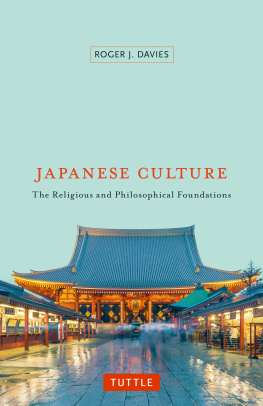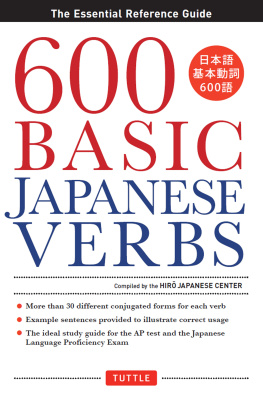Japanese Religions at Home and Abroad
In this important book a leading authority on Japanese religions brings together for the first time in English his extensive work on the subject.
The book is important both for what it reveals about Japanese religions, and because it demonstrates to Western readers the distinctive Japanese approaches to the study of the subject and the different Japanese intellectual traditions which inform it. The book also includes historical, cultural, regional and social approaches, and explains historical changes and regional differences.
Hirochika Nakamaki is Professor at the National Museum of Ethnology, Japan. He has conducted research on Japanese religions in Hawaii, California and Brazil, as well as in Japan. He edited The Culture of Association and Associations in Contemporary Japanese Society (2002), and co-edited Japanese Civilization in the Modern World, VI: Religion (1990) and Possesso e Procisso: Religiosidade Popular no Brasil (1994).
First published 2003
by Routledge
2 Park Square, Milton Park, Abingdon, Oxon, OX 14 4RN
Simultaneously published in the USA and Canada
by Routledge
270 Madison Ave, New York NY 10016
Routledge is an imprint of the Taylor & Francis Group
Transferred to Digital Printing 2006
2003 Hirochika Nakamaki
Typeset in Times by Taylor & Francis Books Ltd
All rights reserved. No part of this book may be reprinted or reproduced or utilised in any form or by any electronic, mechanical, or other means, now known or hereafter invented, including photocopying and recording, or in any information storage or retrieval system, without permission in writing from the publishers.
The publisher makes no representation, express or implied, with regard to the accuracy of the information contained in this book and cannot accept any legal responsibility or liability for any errors or omissions that may be made.
British Library Cataloguing in Publication Data
A catalogue record for this book is available from the British Library
Library of Congress Cataloging in Publication Data
Nakamaki, Hirochika, 1947-
Japanese religions at home and abroad : anthropological perspectives /
Hirochika Nakamaki.
Includes bibliographical references and index.
1. Japan-Religious life and customs. 2. Japanese Americans-Religion.
3. Japanese Brazilians-Religion. I. Title
BL2002. N35 2003
200~.89~956-dc21
2002037182
ISBN10: 0-700-71617-3 (hbk)
ISBN10: 0-415-40621-8 (pbk)
ISBN13: 978-0-700-71617-3 (hbk)
ISBN13: 978-0-415-40621-5 (pbk)
Publisher's Note
The publisher has gone to great lengths to ensure the quality of this reprint but points out that some imperfections in the original may be apparent
In Memory of
Professor Keiichi Yanagawa (1926-1990)
Contents
PART I
At home
PART II
Abroad
Illustrations
Tables
Figures
Foreword
This book which consists of translations of Professor Hirochika Nakamaki's anthropological studies of Japanese religions over a period of thirty years contains some extremely valuable material and insights that only a scholar very familiar with Japanese religious culture at home and abroad could produce. Professor Nakamaki has done in-depth and extensive anthropological research not only on Japanese religion inside but also outside Japan and particularly in Brazil, the country where I first encountered his writings which were to prove of great value to me in my own research.
Professor Nakamaki's approach has been throughout to attempt to understand the meaning and significance of Japanese religion from the perspective of the consumer rather than that of the religious provider. His concern is more with what religion means to the practitioner than with the meaning of religion. It is an approach that opens up a window on the dynamics of the social construction of Japanese religious reality.
For Hirochika Nakamaki Japanese religion is not a seamless, permanent, unchanging reality, but a living, changing reality. It cannot be known simply through the study of official documents. Nor can it be easily characterized. While it is commonplace to read about the tolerant, open, inclusive character of Shinto, Nakamaki is concerned to show that this kind of stereotyping is highly misleading. He avoids stating what Shinto essentially is, preferring instead to explain how it has developed over time and continues to develop.
As with all good quality scholarship, this book will provoke discussion and debate on these issues and on others including the relationship between Shinto and Buddhism in Japanese history. Nakamaki is of the opinion that these are, and have always been in the Japanese context, two distinct religions and that the history of their relationship in Japan has been one of conflict as much as compromise.
One of the very attractive features of this book is its extremely varied content. It includes an interesting attempt to construct a new typology of Japanese religious organizations, and the anthropologist in particular will find fresh perspectives in the chapters on funerals, initiation and pilgrimage. For those engaged in research on modern Japanese religion in general there is a fascinating account of this from the unusual perspective of civilization studies, and others equally intriguing and perceptive on Japanese new religions in Japan, Hawaii and Brazil, among other places. Nakamaki also focuses on the highly relevant and complex topic of religion and ethnic identity in a chapter on the Japanese churches in the United States, in which he describes the role played by these churches in securing for their Japanese members acceptability among Caucasian Americans.
The many years of research carried out by Professor Nakamaki on Japanese religions at home and abroad have enabled him to rethink the traditional ways of understanding these religions and to offer new perspectives for studying, researching and teaching them. What will be widely appreciated in the West, in addition to the content, is the thoroughness with which the theoretical insights contained in this book are grounded in the social reality of the Japanese experience. Anthropological speculation is never allowed to get out of control. The practice of Japanese religion is kept in focus throughout.
While the approach is somewhat idiosyncratic at times there is no attempt here to present the world of Japanese religion as impenetrable to the Western mind and inaccessible to Western scholarship. Nakamaki is not in the business of creating an exclusive cult united around the belief that only Japanese scholars can understand the religious world of the Japanese.
Peter B. Clarke
Professor of the History and Sociology of
Religion, King's College, University of London
Acknowledgements
The idea of producing an English book came to my mind when my papers, which had been translated into English and Portuguese, had surpassed ten in number. I began to input previous publications into the computer for this dream, but the progress was as slow as a snail. Japanese publications and museum activities took priority over this task and little time was left for me for this additional work. An opportunity, however, arose fortunately. I was offered an invitation to become a visiting fellow of the Nissan Institute of Japanese Studies, University of Oxford, for six months starting from April 2000. I have to thank first for this good luck and then special appreciations are extended towards Professor Arthur Stockwin and Dr Roger Goodman of the Nissan Institute for their arrangements and hospitality. I undertook the task of revising the manuscript and writing an introduction. Without the period of this academic bliss in Oxford the present volume would never have come into existence.










